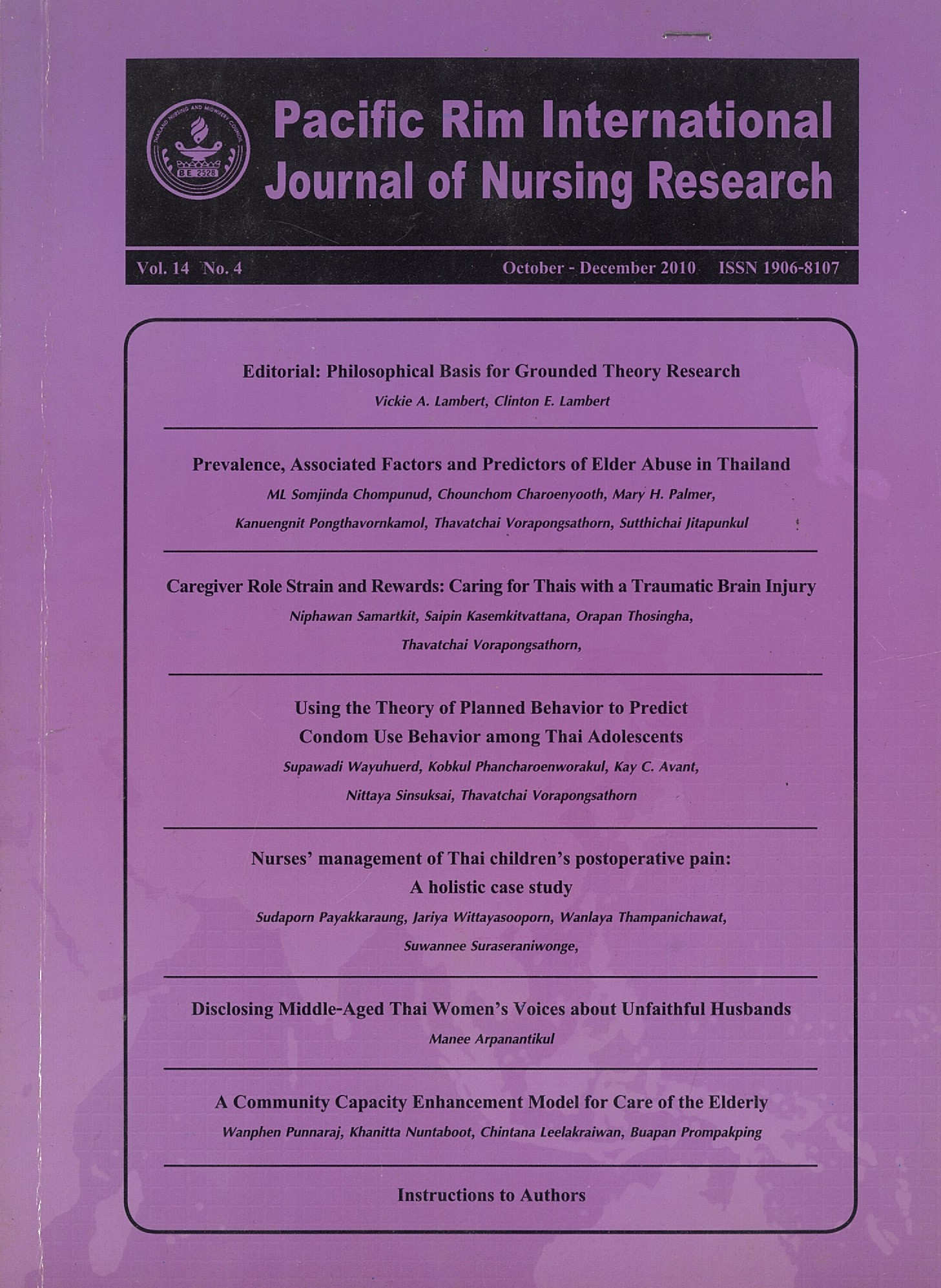Disclosing Middle-Aged Thai Women’s Voices about Unfaithful Husbands
Keywords:
ปัญหาสามีนอกใจ, ผู้หญิงไทยวัยกลางคน, ระเบียบวิธีวิทยาการวิจัยเชิงปรากฏการณ์วิทยาแบบไฮเดกเกอร์, ทฤษฎีสตรีนิยม, Unfaithful husbands, Middle-aged Thai women, Heideggerian phenomenology, Feminist theoryAbstract
บทคัดย่อ
ปัญหาสามีนอกใจหรือปัญหาความสัมพันธ์นอกสมรสเกิดขึ้นได้ในทุกวัฒนธรรม ปัญหาสามีนอกใจเป็นรูปแบบหนึ่งของความรุนแรงต่อผู้หญิงด้านจิตใจ การศึกษาในเรื่องนี้มีน้อยมากในการวิจัยทางการพยาบาลของประเทศไทยเนื่องจากผู้หญิงที่มีสามีนอกใจไม่สามารถยับยั้งการนอกใจของสามีตนเองได้ และผู้หญิงบางคนมักเก็บปัญหานี้ไว้เป็นความลับเพื่อหลีกเลี่ยงการเกิดปัญหาในครอบครัว
การศึกษานี้เป็นการศึกษาถึงประสบการณ์ของผู้หญิงไทยวัยกลางคนที่อาศัยอยู่ในกรุงเทพมหานครที่มีปัญหาเรื่องสามีนอกใจ ระเบียบวิธีวิทยาการวิจัยเชิงปรากฏการณ์วิทยาแบบไฮเดกเกอร์และทฤษฎีสตรีนิยมได้รับการนำมาใช้ในการศึกษาประสบการณ์ของผู้หญิงไทยวัยกลางคนที่มีปัญหาเรื่องสามีนอกใจจำนวน 18 คน เก็บรวบรวมข้อมูลโดยการสัมภาษณ์แบบเจาะลึกพร้อมบันทึกเทปจำนวน 2 ครั้ง ข้อมูลที่ได้จากการสัมภาษณ์นำมาวิเคราะห์โดยใช้วิธีการวิเคราะห์ข้อมูลเชิงเนื้อหา
ผลการศึกษาพบ 4 ประเด็นที่สำคัญดังนี้ การค้นหาความจริง ความทุกข์ทรมาน การเผชิญกับพฤติกรรมที่รุนแรงของสามี และการจัดการกับปัญหา ปัญหาเรื่องสามีนอกใจเป็นปัญหาความสัมพันธ์ในครอบครัวที่มองไม่เห็น ผู้หญิงหลายคนพยายามจะแก้ปัญหาด้วยตัวคนเดียว บางคนไม่กล้าที่จะพูดปัญหานี้ออกมาเนื่องจากกลัวปัญหาการตีตราบาปจากสังคม จากการศึกษานี้เสนอแนะถึงความสำคัญของพยาบาลในการสนับสนุนและช่วยเหลือผู้หญิงที่ประสบปัญหาสามีนอกใจเพื่อให้มีความสุขในชีวิต
คำสำคัญ: ปัญหาสามีนอกใจ; ผู้หญิงไทยวัยกลางคน; ระเบียบวิธีวิทยาการวิจัยเชิงปรากฏการณ์วิทยาแบบไฮเดกเกอร์; ทฤษฎีสตรีนิยม
Abstract
Having an unfaithful husband, one who is involved in one or moreextramarital affairs, can be found within every culture. Contending with an unfaithfulhusband can be seen as a form of psychological violence or abuse against theaffected woman. Because Thai women, who have unfaithful husbands, cannotforestall their spouses’ infidelities and tend to keep this problem private, so as to avoidembarrassing their families, limited published research exists on the topic.
This study sought to explore the experience of 18 middle-aged Thai women,living in Bangkok, who had unfaithful husbands. Heideggerian phenomenology andfeminist theory were used to guide the research design. Data were gathered via taperecorded,in-depth interviews of the participants and analyzed using content analysis.The findings showed four emergent themes: seeking the facts; suffering; facing thehusband’s abusive behavior; and dealing with the problem. Unfaithful husbands werefound to be an invisible family relationship problem, with many of the women tryingto solve the problem by themselves. The women tended not to speak out about theirproblem because of fear of the social stigma associated with the issue. The findingssuggest the importance of nurses supporting women with unfaithful husbands andassisting them in the development of their own well-being.
Key words: Unfaithful husbands; Middle-aged Thai women; Heideggerian phenomenology;Feminist theory
Downloads
How to Cite
Issue
Section
License
Copyright: The Pacific Rim International Journal of Nursing Research, Thailand Nursing & Midwifery Council has exclusive rights to publish, reproduce and distribute the manuscript and all contents therein.








.png)



